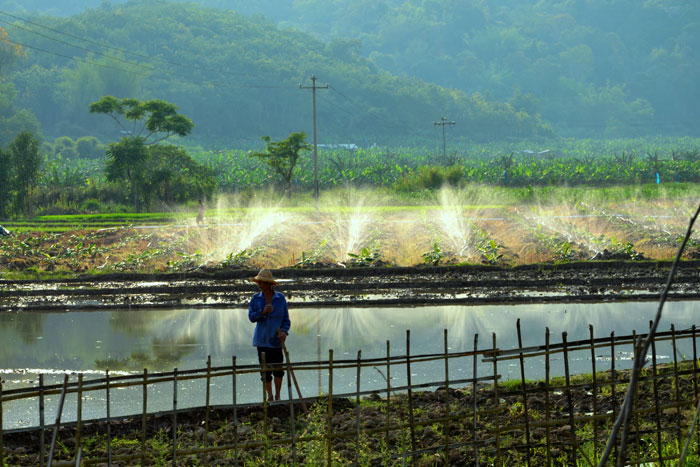In a multi-ethnic region of Yunnan province, China, the Dai minority have thousands of sacred forests. They say, “If there were no forest, there would be no water source; if there were no water, there would be no paddy fields, and as a result, there would be no fish or rice we could live on.”
Sacred natural forests form part of the farming and forest landscape that surrounds each village and community in tropical and subtropical areas of Yunnan province, south-western China. These are strictly protected and periodically worshipped by everyone in the community.
The Dai ethnic group have three distinct kinds of sacred natural forests, each with its specific spiritual purpose. These are as a resting place of the dead, for ancestor worship and the worship of natural gods where they pray for the well being of this life that are known as ‘long’ forests, and as a place to worship Buddha where they pray for the well being of future life. Traditionally, the existence of sacred forests is also believed to grant the communities good weather, good harvests and good health.
Sacred forests and family farming
The sacred natural forest is the basis of the Dai people’s traditional farming system, that includes sacred natural forest, multi-storey home gardens, fuelwood plantations, cash crops, rice paddies and fish ponds. They see their landscape as a whole, and not as individual components. They see it as a self-reliant agroecosystem which gives them all the food they need to live on, in perpetuity.
Ecological studies have confirmed that the natural vegetation that makes up these scared forests serves several positive functions for the ‘folk farming systems’. They serve as protectors of the headwaters of nearby rivers, ensuring the continuing flow of water for irrigation and also reducing the risk of flooding. They provide organic matter for soils downstream, and provide a home for the natural enemies of crop pests, such as owls, woodpeckers, geckos, tree lizards, toads and other animals. They stabilize the soil, prevent erosion, and are buffer against natural disasters.
The Dai say that the existence of their scared forest means that they can farm well without any agricultural chemicals, dams or reservoirs, and are rarely affected by extreme climate events. They have mastered irrigation using the inexhaustible supply of water from these forests, and so paddy rice became their principal food. The Dai community were one of the first people in the region to cultivate rice and have developed more than 60 high quality rice varieties, recognised as precious crop genetic resources.
Traditional life under threat

of nearby rivers, ensuring the continuing flow of water for irrigation. Photo: Yinxian Shi
Due to industrialisation and the ‘modernisation’ of traditional family farming in southern China, many sacred natural forests have been or are being destroyed. In one region alone, Xishuangbanna, there were more than one thousand protected ‘long’ forests before 1958 with a total area of 100,000 hectares.
By 1984, there were only 400 such forests covering 50,000 hectares. In addition, local farmers say that the use of chemical fertilizers and pesticides, the establishment of a water conservancy project, and extreme climate events, all added to the impacts on their traditional farming system. Thankfully, according to a field survey in May 2014, most of those 400 ‘long’ forests are saved, although they are much smaller than before.
Protecting traditional farming landscapes
A certain area of natural vegetation is indispensable for a self-reliant agroecosystem, and as such, protection of these sacred forests is necessary to sustain the Dai’s traditional system of family farming. Fortunately, a group of researchers and government officials working with local farmers and supported by the provincial forestry department, have in 2014 started a broad programme investigating and restoring sacred natural sites in Yunnan. This is a good sign that the focus has begun to change, with such efforts towards the maintenance of traditional family farming in the region, based on sound agroecological practices.
Yinxian Shi
Yinxian Shi is a post doctoral researcher at the Kunming Institute of Botany, Chinese Academy of Sciences, Yunnan, China.
Email: shiyinxian@mail.kib.ac.cn


